10 Amazing Benefits of a High-Fiber Diet
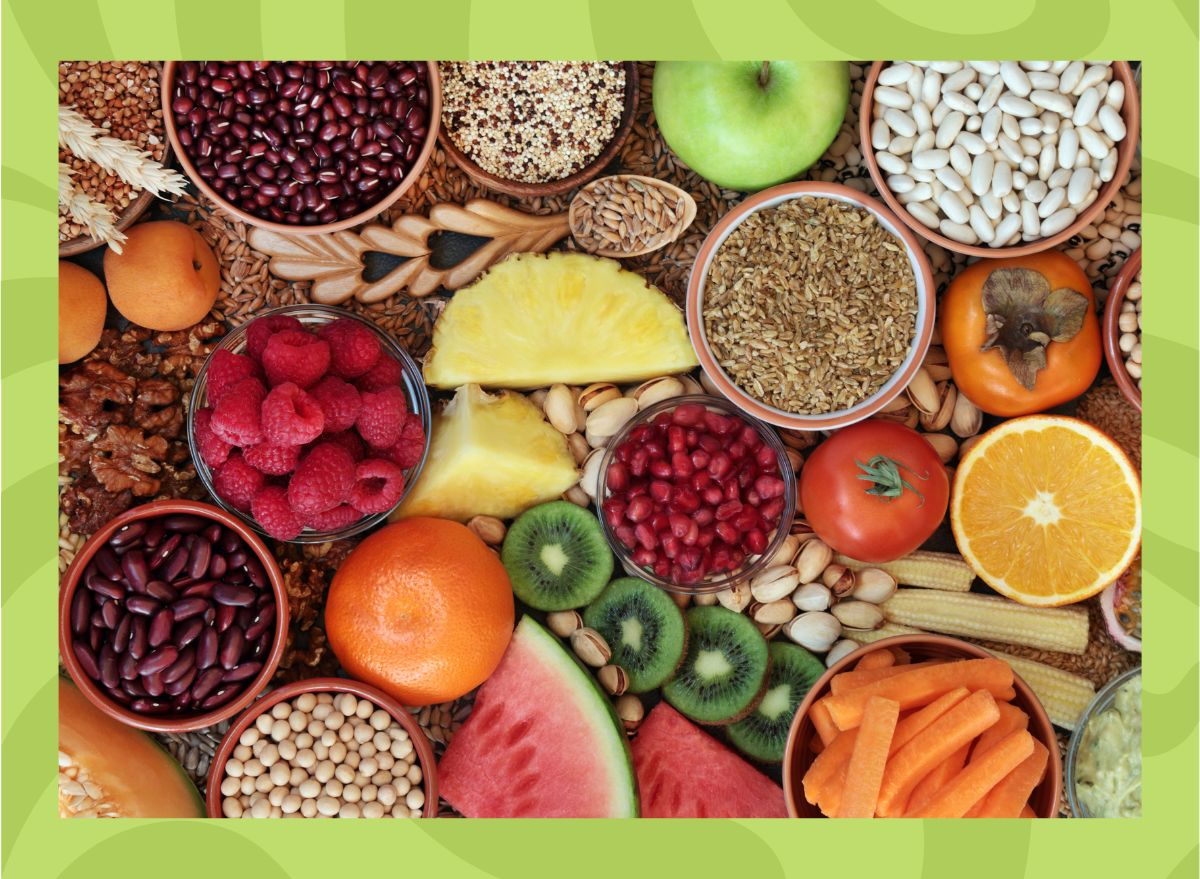
People in the health world talk a lot about fiber and how Americans aren't getting enough of it. Sure, it might seem like a broken record at times, but the truth is that a high-fiber diet is crucial for living a vibrant and healthy life.
Let's start with the basics: what is fiber? Fiber is a type of carbohydrate, but unlike other carbs, it doesn't fully break down during digestion. It's found in plant-based foods and can be divided into two types: soluble and insoluble. Soluble fiber dissolves in water and forms a gel-like substance that slows digestion; these characteristics also allow soluble fiber to support cholesterol management and blood sugar control. Insoluble fiber, on the other hand, adds bulk to your stool and keeps things moving through your digestive tract. Most foods contain a mix of both types, but the ratio of each depends on the food you're eating.
So why all the fuss over fiber? This nutrient can benefit your health in drastic ways, like lowering cholesterol, improving your gut health, helping you lose and manage weight, and even helping you live a longer life. The 2020-2025 Dietary Guidelines for Americans recommends consuming a minimum of 14 grams of fiber per 1,000 calories of food, or 28 grams for an average 2,000-calorie diet.
Read on to learn more about the amazing benefits of eating fiber, and check out these 44 Best High-Fiber Foods to get started on adding more of this nutrient to your day.
It can help you feel more full.

One of the great benefits of eating a diet high in fiber is that fiber-rich foods can help you feel more full, so you can feel satiated with less food.
According to Harvard Health, soluble fiber pulls in water from your gut and forms a gel-like substance, slowing down its full digestion rate. These fibers, according to the National Library of Medicine, "prolong gastric emptying time," which means it takes the food longer to go from the stomach to the small intestine, and therefore delays hunger.
Fiber can improve your gut microbiome.
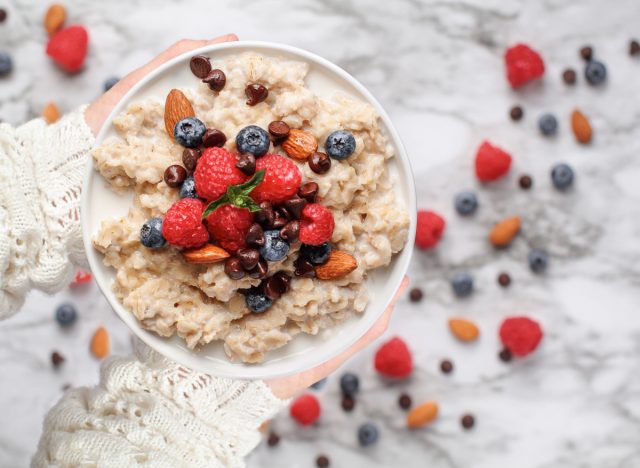
Maintaining a healthy gut is essential for disease prevention and overall well-being, with a high-fiber diet playing a crucial role in improving gut health.
Dietary fibers are fermented by your gut microbiota, resulting in the production of "beneficial microbial metabolites." These metabolites act as energy sources for gut cells, and they play crucial roles in regulating the metabolism, immune system, and brain health, and can even suppress inflammation. A review published in Nutrients suggests that a high fiber intake is linked to a more diverse gut microbiota.
Because of a nationwide shortage in how much fiber is consumed over the last couple of decades, gut health has suffered and disease rates have increased.
You'll be more regular.
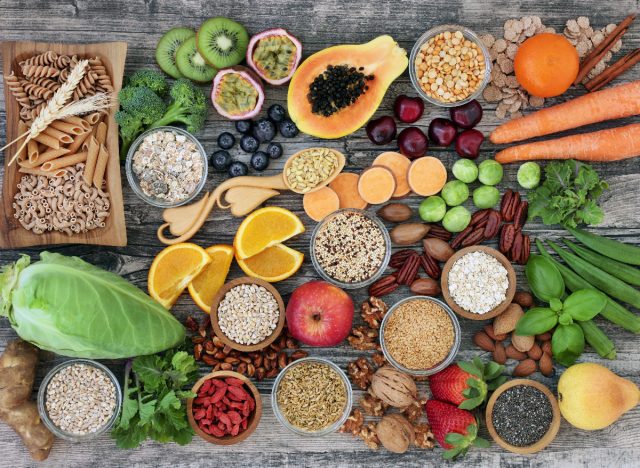
If you often deal with the discomfort of being constipated, it may be a sign that you need to increase your fiber intake! High-fiber foods can help keep you regular and prevent constipation because they can soften your stool, which allows it to pass through more smoothly. Not only does a high-fiber diet help regulate your digestion in the short term, but it's also been found to help prevent related gastrointestinal diseases and disorders.
Fiber can improve your metabolism.
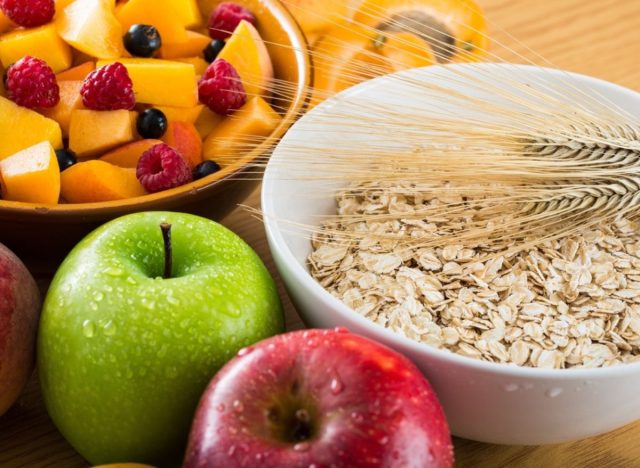
Among many other benefits, getting enough fiber in your day may also benefit your metabolism.
A 2017 study published in the American Journal of Clinical Nutrition looked into the differences between eating refined grains (highly processed grains with little fiber) and whole grains (grains in their more "natural" form that have higher fiber contents). After the study was complete, the group who consumed whole grains had a higher resting metabolic rate, which the researchers believe may contribute to fiber's effect on weight loss and weight management.
It can help you lose or manage weight.

If you're on a weight loss journey or have been wanting to shed a few pounds, including more high-fiber foods in your diet can be a great way to reach your goals.
According to The Journal of Nutrition, fiber intake is associated with greater weight loss, as well as better adherence to dietary plans involving calorie restriction.
This link to weight loss has to do with a few key effects that high-fiber foods have on your body. For one, as we mentioned previously, fiber-heavy foods increase satiety and take longer to digest, which often leads to feelings of fullness with fewer calories consumed than foods that don't have fiber. Another factor is fiber's impact on gut health and creating a more diverse gut microbiota. According to the journal Gut Microbes, a more diverse gut environment has been linked to greater weight loss.
It can lower cholesterol.

We now know that a high-fiber diet can help with things like weight management, gut health, and digestion, but fiber intake has also been linked to heart health as well—especially involving your cholesterol levels.
Fiber, specifically soluble fiber, can help reduce the cholesterol that your bloodstream absorbs and can therefore help lower your LDL cholesterol (the "bad" kind). According to the Mayo Clinic, even just five to 10 grams of soluble fiber per day can decrease your cholesterol levels.
It can help reduce inflammation.
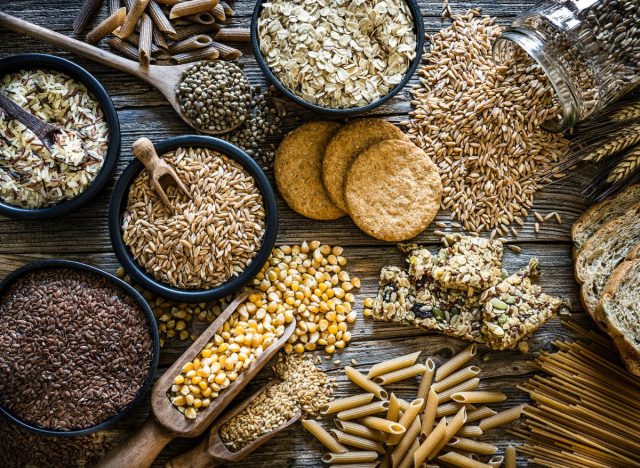
The benefits of fiber just keep going, with research proving that a high-fiber diet may also be able to help reduce chronic inflammation—a serious symptom and potential contributor to many common diseases like Alzheimer's, cardiovascular disease, arthritis, and type 2 diabetes.
According to a report published in the American Journal of Clinical Nutrition, diets higher in fiber are protective against what is called a "C-reactive protein," which is a common inflammatory marker found in the body. What that means is that the higher the amount of C-reactive proteins there are, the more inflammation there is as well. So, these researchers have used these findings to support their recommendation of using fiber as a dietary method for controlling inflammation.
Fiber can help you manage your blood sugar.
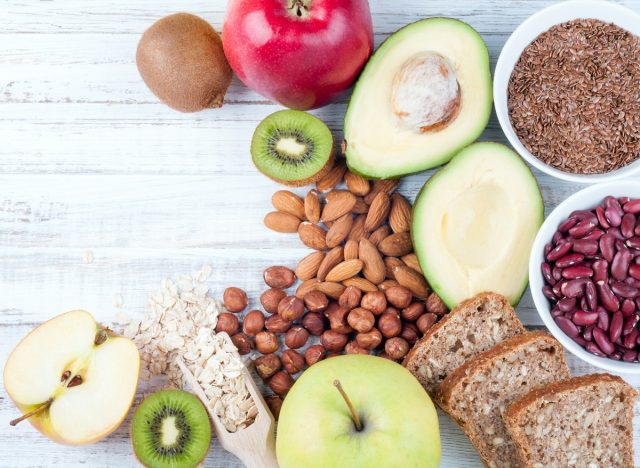
For those watching their blood sugar levels, eating more fiber may be a helpful solution. In fact, according to the CDC, fiber is considered the "carb that helps manage diabetes" because of its ability to help manage your blood sugar.
But where does this link to your blood sugar come from? It ultimately has to do with the fact that fiber isn't digested in the same way that other carbohydrates are. Your body normally breaks down carbs into glucose, and the glucose then enters your bloodstream. This can raise your blood sugar levels. Fiber, on the other hand, can't be broken down into glucose and instead just moves through your body. Because of this, high-fiber foods can help prevent rapid blood sugar spikes after eating carbohydrate-heavy meals.
It can reduce your risk of heart disease.

Numerous research studies show that eating a high-fiber diet can help reduce your risk of cardiovascular disease (CVD) and other heart-related issues. For instance, a 2022 study published in BMC Public Health found that eating more fiber can reduce the risk of CVD, especially in participants ages 20-39 and 40-59.
And, as we now know, high-fiber diets can help lower cholesterol and relieve chronic inflammation, both of which are common factors in heart disease risk.
Fiber is linked to a longer life.
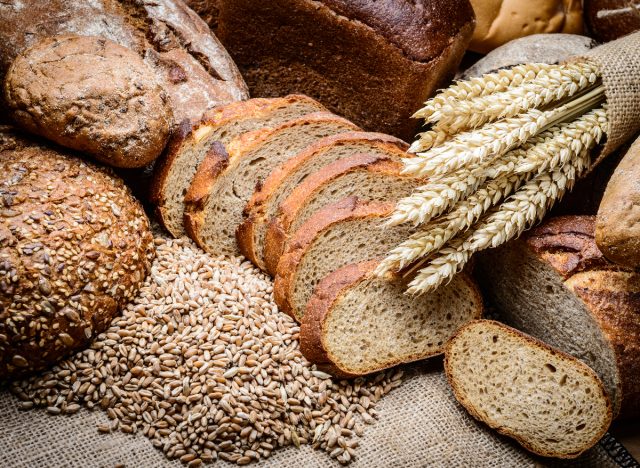
This won't come as much of a surprise when you consider all of the other amazing benefits that a high-fiber diet can lead to, but research has shown that eating enough fiber in your diet can help you live a longer life!
A study published in the Archives of Internal Medicine found that eating fiber can help reduce your risk of premature death, and one report published in Nutrients concluded that fiber is linked to longer life and fewer instances of disease. The Mayo Clinic suggests eating more fiber because of its ability to reduce the risk of cardiovascular disease and cancer-related deaths.
- Source: Fiber. (2023, February 2). The Nutrition Source. https://www.hsph.harvard.edu/nutritionsource/carbohydrates/fiber/#:~:text=Soluble%20fiber%20attracts%20water%20in,risk%20of%20developing%20heart%20disease.
- Source: Akbar A, Shreenath AP. High Fiber Diet. [Updated 2023 May 1]. In: StatPearls [Internet]. Treasure Island (FL): StatPearls Publishing; 2024 Jan-. Available from: https://www.ncbi.nlm.nih.gov/books/NBK559033/
- Source: Quigley EM. Gut bacteria in health and disease. Gastroenterol Hepatol (N Y). 2013 Sep;9(9):560-9. PMID: 24729765; PMCID: PMC3983973.
- Source: Fu J, Zheng Y, Gao Y, Xu W. Dietary Fiber Intake and Gut Microbiota in Human Health. Microorganisms. 2022 Dec 18;10(12):2507. doi: 10.3390/microorganisms10122507. PMID: 36557760; PMCID: PMC9787832.
- Source: Cronin P, Joyce SA, O'Toole PW, O'Connor EM. Dietary Fibre Modulates the Gut Microbiota. Nutrients. 2021 May 13;13(5):1655. doi: 10.3390/nu13051655. PMID: 34068353; PMCID: PMC8153313.
- Source: Barber TM, Kabisch S, Pfeiffer AFH, Weickert MO. The Health Benefits of Dietary Fibre. Nutrients. 2020 Oct 21;12(10):3209. doi: 10.3390/nu12103209. PMID: 33096647; PMCID: PMC7589116.
- Source: James W Anderson, Pat Baird, Richard H Davis, Stefanie Ferreri, Mary Knudtson, Ashraf Koraym, Valerie Waters, Christine L Williams, Health benefits of dietary fiber, Nutrition Reviews, Volume 67, Issue 4, 1 April 2009, Pages 188–205, https://doi.org/10.1111/j.1753-4887.2009.00189.x
- Source: Karl, J. P., Meydani, M., Barnett, J. B., Vanegas, S. M., Goldin, B. R., Kane, A., Rasmussen, H., Saltzman, E., Vangay, P., Knights, D., Chen, C. O., Das, S. K., Jonnalagadda, S. S., Meydani, S. N., & Roberts, S. B. (2017). Substituting whole grains for refined grains in a 6-wk randomized trial favorably affects energy-balance metrics in healthy men and postmenopausal women. The American Journal of Clinical Nutrition, 105(3), 589–599. https://doi.org/10.3945/ajcn.116.139683
- Source: Miketinas DC, Bray GA, Beyl RA, Ryan DH, Sacks FM, Champagne CM. Fiber Intake Predicts Weight Loss and Dietary Adherence in Adults Consuming Calorie-Restricted Diets: The POUNDS Lost (Preventing Overweight Using Novel Dietary Strategies) Study. J Nutr. 2019 Oct 1;149(10):1742-1748. doi: 10.1093/jn/nxz117. PMID: 31174214; PMCID: PMC6768815.
- Source: Koutoukidis DA, Jebb SA, Zimmerman M, Otunla A, Henry JA, Ferrey A, Schofield E, Kinton J, Aveyard P, Marchesi JR. The association of weight loss with changes in the gut microbiota diversity, composition, and intestinal permeability: a systematic review and meta-analysis. Gut Microbes. 2022 Jan-Dec;14(1):2020068. doi: 10.1080/19490976.2021.2020068. PMID: 35040746; PMCID: PMC8796717.
- Source: Cholesterol: Top foods to improve your numbers. (2023, June 14). Mayo Clinic. https://www.mayoclinic.org/diseases-conditions/high-blood-cholesterol/in-depth/cholesterol/art-20045192
- Source: Professional, C. C. M. (n.d.-a). inflammation. Cleveland Clinic. https://my.clevelandclinic.org/health/symptoms/21660-inflammation
- Source: Ma Y, Griffith JA, Chasan-Taber L, Olendzki BC, Jackson E, Stanek EJ 3rd, Li W, Pagoto SL, Hafner AR, Ockene IS. Association between dietary fiber and serum C-reactive protein. Am J Clin Nutr. 2006 Apr;83(4):760-6. doi: 10.1093/ajcn/83.4.760. PMID: 16600925; PMCID: PMC1456807.
- Source: Fiber. (2023b, February 2). The Nutrition Source. https://www.hsph.harvard.edu/nutritionsource/carbohydrates/fiber/#:~:text=Though%20most%20carbohydrates%20are%20broken,and%20blood%20sugar%20in%20check.
- Source: Zhang, S., Tian, J., Lei, M. et al. Association between dietary fiber intake and atherosclerotic cardiovascular disease risk in adults: a cross-sectional study of 14,947 population based on the National Health and Nutrition Examination Surveys. BMC Public Health 22, 1076 (2022). https://doi.org/10.1186/s12889-022-13419-y
- Source: Heart Disease and Stroke | CDC. (n.d.). https://www.cdc.gov/chronicdisease/resources/publications/factsheets/heart-disease-stroke.htm#:~:text=Leading%20risk%20factors%20for%20heart,unhealthy%20diet%2C%20and%20physical%20inactivity.
- Source: Park Y, Subar AF, Hollenbeck A, Schatzkin A. Dietary fiber intake and mortality in the NIH-AARP diet and health study. Arch Intern Med. 2011 Jun 27;171(12):1061-8. doi: 10.1001/archinternmed.2011.18. Epub 2011 Feb 14. PMID: 21321288; PMCID: PMC3513325.
- Source: Tucker LA. Dietary Fiber and Telomere Length in 5674 U.S. Adults: An NHANES Study of Biological Aging. Nutrients. 2018 Mar 23;10(4):400. doi: 10.3390/nu10040400. PMID: 29570620; PMCID: PMC5946185.
- Source: Dietary fiber: Essential for a healthy diet. (2022d, November 4). Mayo Clinic. https://www.mayoclinic.org/healthy-lifestyle/nutrition-and-healthy-eating/in-depth/fiber/art-20043983









